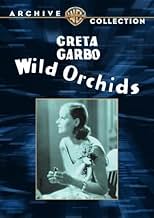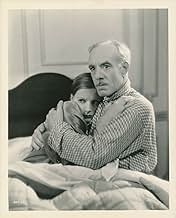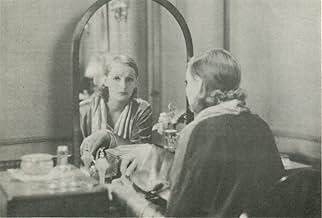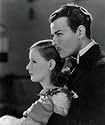IMDb-BEWERTUNG
6,4/10
798
IHRE BEWERTUNG
Füge eine Handlung in deiner Sprache hinzuA prince in Java tries to seduce his visitor's wife, but he's discovered.A prince in Java tries to seduce his visitor's wife, but he's discovered.A prince in Java tries to seduce his visitor's wife, but he's discovered.
- Auszeichnungen
- 3 wins total
Empfohlene Bewertungen
This film seems a lot like a warm-up for The Painted Veil, another Garbo ego picture which would be released in 1934. The story is similar, the locale is in Asia, she has a much older, boring husband, a new, exciting lover...
I could go on and on about how similar they are.
It's not technically a silent movie, rather a sound movie without dialogue, and perhaps that's its only redeeming quality. The sets are nice, but the intertitles do get a little corny (and aren't overly inventive).
Garbo would go onto better things, but for now she was still making silent pictures in an era where even Gloria Swanson had transferred to sound.
Greta Garbo is quite pretty in this film, and she gets to wear a lot of nice costumes, but she isn't given much to do other than that.
I was rooting for the husband more than I was rooting for the lover, so the Hollywood happy ending was welcome. The tiger hunt was probably the best part of the film.
I preferred The Painted Veil, not because I'm a silent movie-phobe (because I am not), but because her leads are more colorful and she's given more to do than be a window decoration.
I could go on and on about how similar they are.
It's not technically a silent movie, rather a sound movie without dialogue, and perhaps that's its only redeeming quality. The sets are nice, but the intertitles do get a little corny (and aren't overly inventive).
Garbo would go onto better things, but for now she was still making silent pictures in an era where even Gloria Swanson had transferred to sound.
Greta Garbo is quite pretty in this film, and she gets to wear a lot of nice costumes, but she isn't given much to do other than that.
I was rooting for the husband more than I was rooting for the lover, so the Hollywood happy ending was welcome. The tiger hunt was probably the best part of the film.
I preferred The Painted Veil, not because I'm a silent movie-phobe (because I am not), but because her leads are more colorful and she's given more to do than be a window decoration.
MGM had Greta Garbo quite busy making films during 1928 and 1929 as the studio saw the approach of sound film possibly destroying one of their top assets. Nobody knew what the outcome of Garbo's career would be at the time.
Thus Greta Garbo made silents until 1930's "Anna Christie". This silent film is not really silent at all. It has a very sophisticated score for its time, including sound effects, crowd noises, and even singing during musical numbers, with long shots of the singers so you can't see that there is no true synchronization with the singers themselves.
The story is that of 50ish John Sterling (Lewis Stone) and his young wife, Lillie (Greta Garbo). The two are embarking on a cruise to Java so that John can mix business with pleasure. His business is to look over some plantations that he may buy. The pleasure is his desire to hunt and shoot a tiger while in Java. On the boat the couple meet Prince De Gace, played by Nils Asther. John is by no means a neglectful husband, but at age 50 he has largely left his romantic days behind him. This makes Lillie a likely target for the charming prince and his silver tongue. He makes a play for her right off the bat, and continues his chase as the Sterlings remain guests in his home. Lillie is torn, but tries her best to avoid the prince and his advances. One night during their stay, after returning from a day of looking at plantations, John sees the silhouettes of the prince and Lillie on the drawn shade of the house just after the prince has grabbed her for a quick kiss. What will John do about this situation? The acting in this film is quite well done. Asther comes across well as the slimy but attractive prince, and Lewis Stone was a wonderful silent actor. His surprise when he first sees the couple in an embrace, and his look of both great disdain and knowing when he later sees the prince flirting with a servant girl says it all. Yet, like Garbo, some of his best performances would come with talking pictures where he could both artfully play the cad in the MGM precodes as well as Judge Hardy of the Andy Hardy series fame.
Existing prints of this film are quite well preserved, and I highly recommend it for silent film enthusiasts.
Thus Greta Garbo made silents until 1930's "Anna Christie". This silent film is not really silent at all. It has a very sophisticated score for its time, including sound effects, crowd noises, and even singing during musical numbers, with long shots of the singers so you can't see that there is no true synchronization with the singers themselves.
The story is that of 50ish John Sterling (Lewis Stone) and his young wife, Lillie (Greta Garbo). The two are embarking on a cruise to Java so that John can mix business with pleasure. His business is to look over some plantations that he may buy. The pleasure is his desire to hunt and shoot a tiger while in Java. On the boat the couple meet Prince De Gace, played by Nils Asther. John is by no means a neglectful husband, but at age 50 he has largely left his romantic days behind him. This makes Lillie a likely target for the charming prince and his silver tongue. He makes a play for her right off the bat, and continues his chase as the Sterlings remain guests in his home. Lillie is torn, but tries her best to avoid the prince and his advances. One night during their stay, after returning from a day of looking at plantations, John sees the silhouettes of the prince and Lillie on the drawn shade of the house just after the prince has grabbed her for a quick kiss. What will John do about this situation? The acting in this film is quite well done. Asther comes across well as the slimy but attractive prince, and Lewis Stone was a wonderful silent actor. His surprise when he first sees the couple in an embrace, and his look of both great disdain and knowing when he later sees the prince flirting with a servant girl says it all. Yet, like Garbo, some of his best performances would come with talking pictures where he could both artfully play the cad in the MGM precodes as well as Judge Hardy of the Andy Hardy series fame.
Existing prints of this film are quite well preserved, and I highly recommend it for silent film enthusiasts.
While "Wild Orchids" is not a major classic, the film does illustrate the magic of the Silents at their peak. Within a few minutes, director Sidney Franklin establishes the vulnerable relationship between Lewis Stone, a businessman with an interest in commerce and hunting, and Greta Garbo, his younger and neglected wife. The couple embarks on a sea voyage to Java in search of tea plantations, and competition for Garbo's affection soon appears in the guise of an exotic prince. Stone's apparent and puzzling preoccupation with business over his beautiful wife is hard to fathom. Garbo could be described as Stone's trophy wife, and trophy she is. As garbed by Adrian and photographed by William H. Daniels, Garbo would be a prized trophy for any man or woman anywhere any time.
Once aboard ship, with the same economy of style used to illustrate the marriage of Lillie and John Sterling, Franklin quickly sketches the character of Nils Asther, the Javanese prince. Garbo watches in horror as Asther whips a servant outside his cabin, and his dark eyes and pencil-thin mustache speak volumes. Although too pretty and occasionally fey to be totally convincing as a Lothario, Asther works hard at befriending Stone and seducing his wife. Unfortunately, Stone's indifference towards his wife only helps propel this film down a familiar road.
The Danish Asther as the Javanese Prince De Gace is as Asian as the realm he rules, which was conjured in the frenzied minds of MGM's art directors. The welcome banquet is reminiscent of the feast in "Indiana Jones and the Temple of Doom," but without the snakes and eyeballs. At one point, Garbo dons a local costume and, although she fails to charm her husband, she does presage her subsequent appearance, opposite Stone once again, as Mata Hari. Despite Asther's occasional lapses, the performances of the three leads are naturalistic. Stone is always solid and dependable, and Garbo, well, she is always captivating whenever on screen. While not among her greatest, "Wild Orchids" is vintage Garbo, representative of silent films at their best, and worthy entertainment.
Once aboard ship, with the same economy of style used to illustrate the marriage of Lillie and John Sterling, Franklin quickly sketches the character of Nils Asther, the Javanese prince. Garbo watches in horror as Asther whips a servant outside his cabin, and his dark eyes and pencil-thin mustache speak volumes. Although too pretty and occasionally fey to be totally convincing as a Lothario, Asther works hard at befriending Stone and seducing his wife. Unfortunately, Stone's indifference towards his wife only helps propel this film down a familiar road.
The Danish Asther as the Javanese Prince De Gace is as Asian as the realm he rules, which was conjured in the frenzied minds of MGM's art directors. The welcome banquet is reminiscent of the feast in "Indiana Jones and the Temple of Doom," but without the snakes and eyeballs. At one point, Garbo dons a local costume and, although she fails to charm her husband, she does presage her subsequent appearance, opposite Stone once again, as Mata Hari. Despite Asther's occasional lapses, the performances of the three leads are naturalistic. Stone is always solid and dependable, and Garbo, well, she is always captivating whenever on screen. While not among her greatest, "Wild Orchids" is vintage Garbo, representative of silent films at their best, and worthy entertainment.
During nights scented with the perfume of WILD ORCHIDS, a Javanese prince woos the beautiful wife of a visiting American tycoon.
Although really little more than a story about a romantic triangle, the excellent acting & superb presentation make this a very enjoyable film.
Greta Garbo, exquisite & serene, shows once again that she was more than just a perfectly sculpted face. She was also a very disciplined actress who used her tightly controlled body to convey emotional depths and subtle nuances. Even in what for her was a rather minor film, she is a marvel to watch, beyond superlatives, exhausting all adjectives. She is simply Garbo and that is enough.
For sheer exoticism, few Hollywood male stars of the period could compete with Garbo. Nils Asther was one of these. Although Scandinavian, something about the bone structure of his face made him ideal for Asian roles. He had already enjoyed much success as a matinee idol by the time WILD ORCHIDS was filmed. A fine actor, he seems loath to accede all of the viewers' attention to Garbo. (Swedes both, they must have had some interesting private conversations on the set.) Asther makes his characterization of the Prince a compelling blend of charm & cowardice - a creature quite capable of seducing his sultry costar into marital infidelity. The onset of talkies would prove difficult for Asther, his heavy accent making it hard for MGM to cast him effectively and he would eventually return to Sweden. However, when given the right role, as in Frank Capra's THE BITTER TEA OF GENERAL YEN (1933), Asther was able to exhibit the natural talent he was seldom called upon to use.
Lewis Stone is the solid fulcrum over which his two extravagant costars teeter. While they exude passion & sensuality, he revels in the simpler virtues - duty, dignity, and, when he finally catches on to the Prince's depredations, righteous wrath. He manages to infuse all this with a quiet sense of befuddled humor, which only makes his character all the more human.
The film's first rate production values make the heat & hedonism of Java come alive for the viewer. The Javanese dancing is of particular interest. The use of sound effects in this late silent film is of some significance - they perfectly illustrate where some film purists thought the cinema should remain: with music and effects, but definitely no dialogue.
Although really little more than a story about a romantic triangle, the excellent acting & superb presentation make this a very enjoyable film.
Greta Garbo, exquisite & serene, shows once again that she was more than just a perfectly sculpted face. She was also a very disciplined actress who used her tightly controlled body to convey emotional depths and subtle nuances. Even in what for her was a rather minor film, she is a marvel to watch, beyond superlatives, exhausting all adjectives. She is simply Garbo and that is enough.
For sheer exoticism, few Hollywood male stars of the period could compete with Garbo. Nils Asther was one of these. Although Scandinavian, something about the bone structure of his face made him ideal for Asian roles. He had already enjoyed much success as a matinee idol by the time WILD ORCHIDS was filmed. A fine actor, he seems loath to accede all of the viewers' attention to Garbo. (Swedes both, they must have had some interesting private conversations on the set.) Asther makes his characterization of the Prince a compelling blend of charm & cowardice - a creature quite capable of seducing his sultry costar into marital infidelity. The onset of talkies would prove difficult for Asther, his heavy accent making it hard for MGM to cast him effectively and he would eventually return to Sweden. However, when given the right role, as in Frank Capra's THE BITTER TEA OF GENERAL YEN (1933), Asther was able to exhibit the natural talent he was seldom called upon to use.
Lewis Stone is the solid fulcrum over which his two extravagant costars teeter. While they exude passion & sensuality, he revels in the simpler virtues - duty, dignity, and, when he finally catches on to the Prince's depredations, righteous wrath. He manages to infuse all this with a quiet sense of befuddled humor, which only makes his character all the more human.
The film's first rate production values make the heat & hedonism of Java come alive for the viewer. The Javanese dancing is of particular interest. The use of sound effects in this late silent film is of some significance - they perfectly illustrate where some film purists thought the cinema should remain: with music and effects, but definitely no dialogue.
Greta Garbo is great as the neglected wife while Lewis Stone portrays his part of husband too busy with his work to realize he is neglecting his wife. Nils Aster portrays a Javanese Prince who clearly has self control issues. He not only beats his servants but even attempts to seduce Greta Garbo when he realizes she is being neglected by her husband. His repugnant behavior towards her border on attempted rape.
The Synchronized Score is pleasing. I especially like the theme song "You Are Like Wild Orchids" which is played and sung several times. The native Javanese song and dance sections however are quite strange and features unpleasant discordant melodies. The removal of that sequence from the film would have improved the picture tremendously.
The Synchronized Score is pleasing. I especially like the theme song "You Are Like Wild Orchids" which is played and sung several times. The native Javanese song and dance sections however are quite strange and features unpleasant discordant melodies. The removal of that sequence from the film would have improved the picture tremendously.
Wusstest du schon
- WissenswertesDuring production Greta Garbo's friend and mentor, Mauritz Stiller, died in Sweden. Devastated by his death, Garbo traveled to Sweden incognito to mourn his death. Her secretive travel plans were quickly foiled when she was recognized on the voyage.
- Zitate
Prince De Gace: The East is a country of the senses - warm, mysterious - like the kiss of a lover.
- VerbindungenFeatured in The Divine Garbo (1990)
- SoundtracksYou Are Like Wild Orchids
Top-Auswahl
Melde dich zum Bewerten an und greife auf die Watchlist für personalisierte Empfehlungen zu.
- How long is Wild Orchids?Powered by Alexa
Details
- Erscheinungsdatum
- Herkunftsland
- Sprache
- Auch bekannt als
- Wild Orchids
- Drehorte
- Produktionsfirma
- Weitere beteiligte Unternehmen bei IMDbPro anzeigen
Box Office
- Budget
- 322.000 $ (geschätzt)
- Laufzeit
- 1 Std. 40 Min.(100 min)
- Sound-Mix
Zu dieser Seite beitragen
Bearbeitung vorschlagen oder fehlenden Inhalt hinzufügen


























